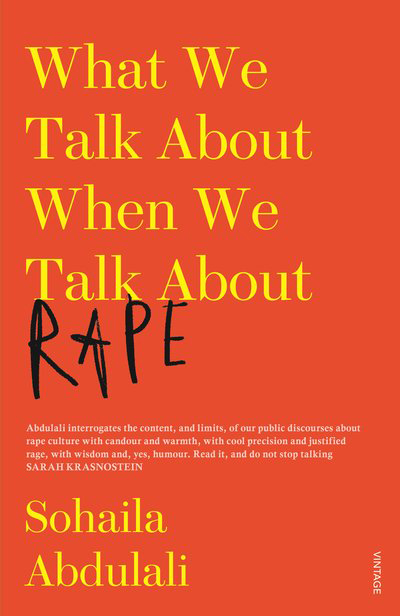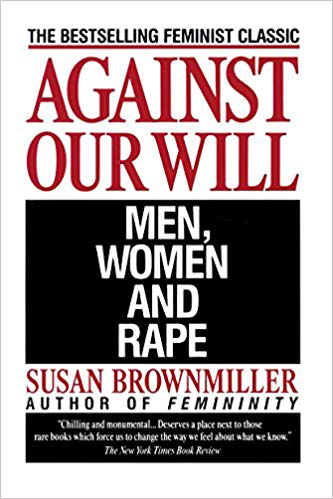It takes guts to talk about sexual violence Two women writing about rape over 40 years apart say it differently, but agree that the perpetrator always has a choice.
What do you do when your teenage daughter tells you she’s just been raped? In Sohaila Abdulali’s case, her father gathered her into his arms and held her. Then he listened to how four men wielding sickles led her and her male friend up a mountain, attacked them and raped her something like nine-ten times. After that he asked what she’d like to do. But this response is the exception, Sohaila reveals in What We Talk About When We Talk About Rape, a timely new book that says far more than it appears to. Incidentally, the common reaction when someone reports a rape is censorious, judgmental, shaming, questioning of character, an unsympathetic ‘you must have asked for it’… This is all the more reason why Sohaila Abdulali’s book is so important and why it should be essential reading for everybody of age.
The author is an unusual individual. Encouraged by friends and discouraged by the treatment she got from the police at the time, she wrote about her experience in a feminist magazine called Manushi (June-July 1983): “I was gang-raped three years ago, when I was 17 years old. My name and my photograph appear with this article.” In simple, direct language, she wrote honestly and with great maturity: “Time and again people have hinted that perhaps death would have been better than the loss of that precious ‘virginity’. I refuse to accept this. My life is worth too much to me.”
Today, the gathering strength of the #MeToo movement and the horrific state of society it reveals has got that old article circulating on the social media. Meanwhile, Sohaila reclaimed her life, in the process working extensively on the subject in an effort to understand why rape happens and on such a vast scale all around the world. Her ruminations as victim, researcher, activist and counsellor resulted in What We Talk About…
The book is also about “what we don’t talk about. We don’t talk enough about aggravating phobias. We don’t talk enough about rebuilding trust. We don’t talk enough about joy and rage and how to fit both into our lives… . Rape drains the light. I want to let some light back in. I don’t have answers, but I hope to at least illuminate some of the questions and assumptions we all carry around with us. We must talk about rape, and we must talk about how we talk about rape.”
It’s a conversation — with herself, with the reader; it’s a conversation packed tight with questions. There are not many answers, but there is understanding and a burning desire to figure out why. One thought that emerges from Sohaila’s questioning is this: Is there anyone who doesn’t know or know of someone in their close or not-so-intimate circle who has been raped or sexually molested or fingered or groped? I need more than two hands to count the number of people — women, girls, boys — I know.
That knowledge is never far from you and the churning it induces can be awfully confusing, in the way, for instance, the #MeToo deluge has been distressing. When she says, “…it makes perfect sense to me when I see photographs of famous women smiling and hugging men whom they later point out as rapists. The fact that you have confused feelings about the person who hurt you doesn’t make you guilty. It makes you human,” it begins to make sense.
Sohaila quotes from the experiences of victims, activists and counsellors from all over the world. She reminds us of the Mathura rape case of the 1970s when a tribal woman was raped in the police station. She remembers Jyoti Singh, the young woman whose rape and subsequent death galvanised the whole nation to protest. There was much less noise when the body of eight-year-old Asifa was found in the jungles of Kathua in J&K. She had been raped and murdered, her head bashed in. Eight years old. There were protests, but this time the protests took on a communal aspect.
The person who actually coined the phrase “MeToo” was a black woman called Tarana Burke who, in 1997, was privy to the confidences of a 13-year-old who had been sexually abused. Tarana called her movement MeToo. Not only that, Sohaila points out, in April 2016, “two writers, one Colombian and one Mexican, put out a call on Twitter asking women to post about sexual harassment. Thousands spoke out, thousands marched in the streets, and gender-based violence became part of the national discourse. And yet, for many of us living north of that border, #MeToo was the first phenomenon of its kind.” That protest was called Primavera Violet (Violet Spring).
Reading this book helps understand why the “boys will be boys” argument can never be legal or moral currency. We need to set boundaries, we must believe when someone tells us they have been violated, we must support and listen. Rape is not sex, Sohaila reminds us, it is sexual violence.
Thanks to her, I watched a TED talk video featuring Thordis Elva and Tom Stranger, who placed in context a book they wrote together called South of Forgiveness. Years ago, when Tom was an 18-year-old exchange student in Iceland, he had forced himself upon his 16-year-old girlfriend, Thordis. It took many years for him to acknowledge that what he had done was rape. In a unique effort initiated by Thordis, they decided to meet to confront that act and deal with their demons head on. In the process, they wrote a book. When, in the talk, Thordis says that rape is not a women’s issue, the audience breaks into applause. It is a powerful sharing.
Time and again people have hinted that perhaps death would have been better than the loss of that precious ‘virginity’. I refuse to accept this. My life is worth too much to me.
Susan Brownmiller’s Against Our Will is a seminal work that takes a completely different approach. Published in 1975, it was the first book that engaged with this subject and is still considered a classic, although some of her theories are contestable. As Sascha Cohen says in his critique of the book in TIME (October 2015), Brownmiller’s “stated purpose … was to ‘give rape its history’ and she details incidents of sexual violence dating back to the ancient Babylonians, as well as traditions of wartime rape in the modern era. Her emphasis on rape as a tactic in war and other forms of political conflict framed sexual violence as a collective social problem as well as a deliberate, calculated act meant to humiliate and degrade the victim.” He goes on to say: “What today’s feminists describe as ‘rape culture’ has its roots in Brownmiller’s theory of rape as a means of social control, her emphasis on gender role socialisation and her critique of the glorification of sexual violence in the media.”
The extent of her research is mindboggling, and the way she puts it together is eminently readable, although it lacks Sohaila’s easy style. But that’s because the two books are fundamentally different in character. Sohaila’s book can be read in the context of this seminal work and the unique collaboration between Thordis and Tom. Or it can be read alone. Either way, each of these books remind us that we are not alone.
When Thordis and Tom spoke at the Royal Festival Hall in London, people gathered outside to protest the presence of a rapist in the building. Rapists don’t need to be humanised, they shouted. “I disagree,” says Sohaila. “I think we have to start by humanising rapists, not to downplay their actions but to face the fact that rapists are human. That makes the crime worse, not better. Humans have choices, and rape is a horrible one.”
It is a terrible choice. That’s why Susan Brownmiller deserves the last word when she writes, “My purpose…has been to give rape its history. Now we must deny it a future.”
The columnist is a children’s writer and senior journalist.


